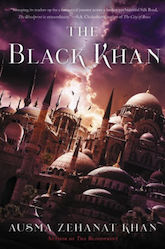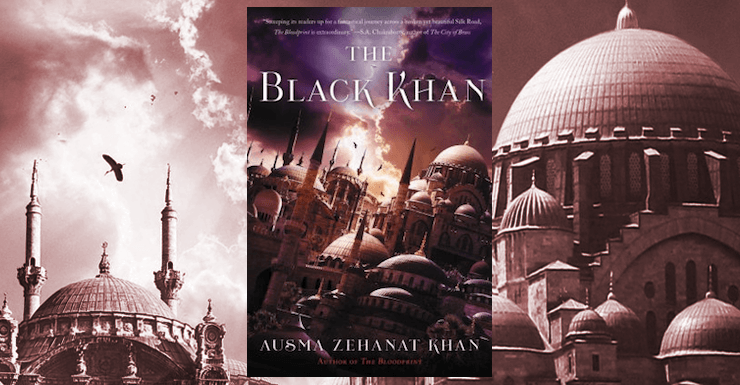The One granted the world the gift of the Claim, holy words used to summon magic. Arian is one of those who can wield it: the daughter of linguists raised in a scriptorium, her entire life has been dedicated to the Claim. In fact, Arian has been one of the Companions of Hira—a group of women who study and use the Claim—since she was a child. But across Khorasan, a man known as the One-Eyed Prophet has led the rising Talisman group in a campaign to dominate civilization, subjugating the women of Khorasan and destroying libraries and knowledge in the process. The Companions seek to overthrow the Talisman—but they need a text called the Bloodprint first.
Spoilers for The Bloodprint, book one of the Khorasan Archives, follow!
At the end of The Bloodprint, the book sought by Arian and her fellow Companion Sinnia slipped from their grasp—quite literally, in Arian’s case—and Arian, Sinnia, and the Silver Mage Daniyar must fight to escape the clutches of the Authoritan and reclaim the Bloodprint from Rukh, the Black Khan… even as the Khan fortifies his city, Ashfall, against the Talisman’s impending assault.
Despite the dramatic opening, The Black Khan begins much more slowly than The Bloodprint. The revelations at the end of The Bloodprint made the next moves of the story unsurprising, since the novel’s ending limited the options of the perspective characters—though The Black Khan expands its cast of perspective characters to include members of other factions and with motivations at direct odds with Arian, Sinnia, and Daniyar.
The plot begins to pick up as the Talisman threat to Ashfall begins to gain traction, taking the cast across the lands of Khorasan. Ausma Zehanat Khan’s worldbuilding in The Bloodprint was gorgeous, and she continues to flesh out Khorasan in The Black Khan: the novel’s setting ranges from North Khorasan, the walled-off land the Authoritan rules, to the Black Khan’s holding of Ashfall far to the southwest. The Bloodprint, on the other hand, primarily tracked Arian and Sinnia’s journey from the Citadel of Hira east to the Wandering Cloud Door, south of the wall that separates North Khorasan from the other lands, making the settings of The Black Khan gorgeously different from its predecessor.
The writing describing the clothing, setting, and texts that populate the world is also incredibly rich, especially in the decadent settings of the Authoritan and Black Khan’s courts. As the First Oralist of the Companions of Hira, Arian’s role in the story—and among the citizens of Khorasan—is often emphasized by her appearance: while as a prisoner of the Authoritan she’s dressed in clothes meant to humiliate her, Arian otherwise tends to wear clothing and jewelry considered fitting for her position and status.
Buy the Book


The Black Khan
Another great strength of the Khorasan Archives series so far is its exploration of faith, religion, and how those in power adhere and abuse both. Faith in the One and in the Claim enables the wielding of its magic, yet the characters who wield power of any kind—the magic of the Claim, political power, or the power of religious office—each perceive and address faith and religion differently. Arian follows the spirit of the Claim and the rules of the Companions, if not quite the letter; Ilea, the leader of the Companions, views religious rules and restrictions as something she can bend to her own will and desires. More villainous characters such as the One-Eyed Prophet and the Authoritan twist the Claim as well as the tenants of religion to turn its results into the opposite of its meaning or intent, perverting or “occulting” the Claim itself. The message of the book is emphasized in a passage of the Claim recited near the end of the book: “Whatever good befalls us is from the One, whatever evil is from ourselves.”
Power is a major theme of the series and focused on with more intensity in The Black Khan. The machinations of power, both magical and political, are a focus of both the Authoritan arc in the first act of the novel and the Ashfall assault arc in the third act. Possessing power isn’t what makes a person evil, but rather the desire to gain more power—an idea only emphasized by the key passage of the Claim quoted above. The Black Khan wrestles with power in a very different manner than The Bloodprint: while the latter focused on how power is stripped away via destruction of knowledge and the decline of literacy, the former examines the pursuit of power and the price paid—both by the seeker and by the seeker’s demands.
The Khorasan Archives series is an excellent one for readers fascinated with preservation of artifacts and the power of language, and The Black Khan takes readers even deeper into an exploration of precisely how the power of language is preserved through both artifacts and people. Despite its rocky start, The Black Khan is still recommended reading for fantasy fans seeking their next epic fantasy read.
The Black Khan is available from Harper Voyager.
Feliza Casano writes about science fiction, manga, and other geeky media around the internet. She currently lives in Philadelphia, where she moderates two book clubs and lines her walls with stacks of books. Visit her online or follow her on Twitter @FelizaCasano.










